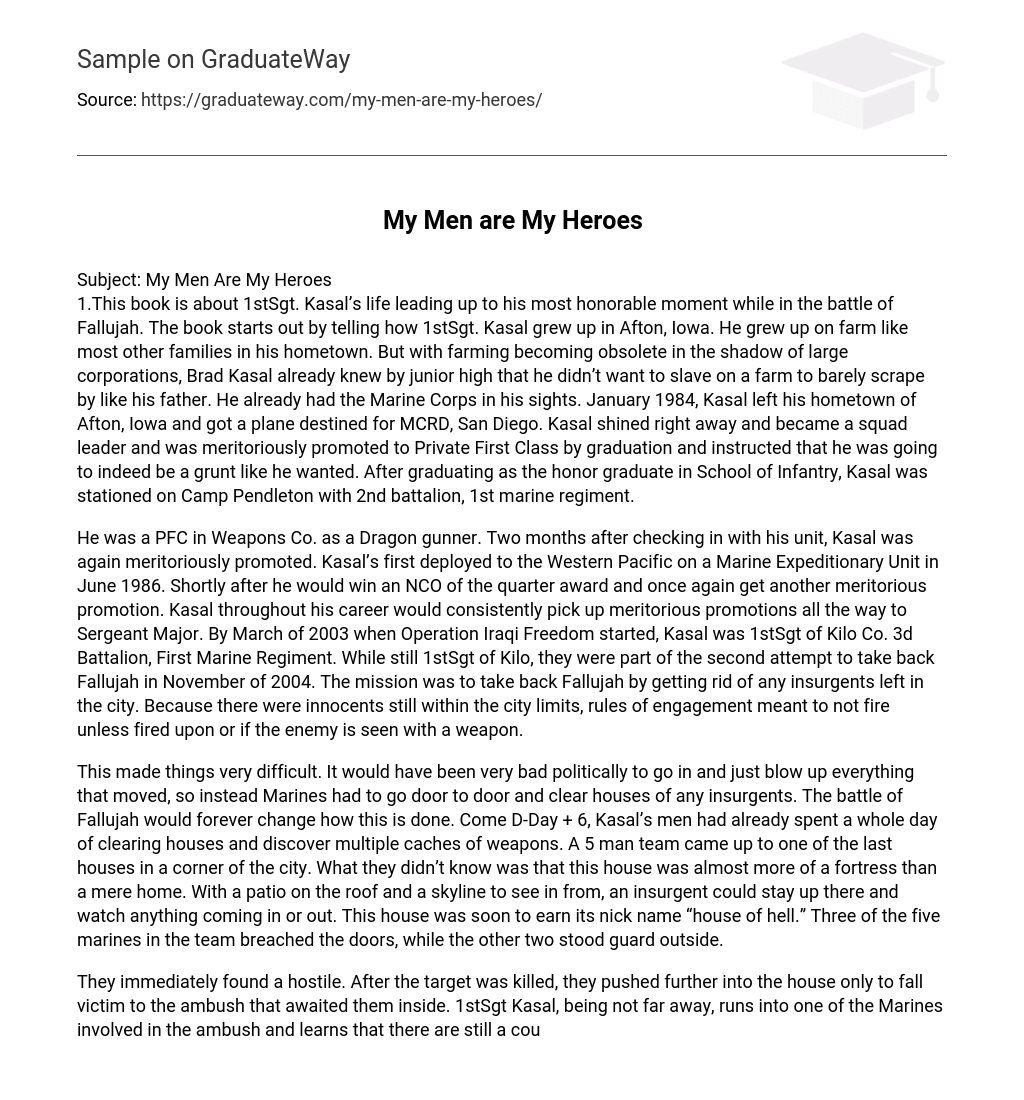Subject: “My Men Are My Heroes”
1. The book focuses on the life of 1st Sgt. Kasal and his most honorable moment in the battle of Fallujah. It begins by describing Kasal’s upbringing in Afton, Iowa, where he lived on a farm like many others in his hometown. However, due to changes in farming and the growth of large corporations, Kasal realized early on during junior high that he did not want to continue working on a farm like his father. Instead, he aspired to join the Marine Corps.
2. In January 1984, Kasal left Afton, Iowa and flew to MCRD in San Diego. From the beginning, Kasal displayed potential and quickly became a squad leader. He was promoted to Private First Class upon graduation based on merit and was informed that he would fulfill his dream of becoming a grunt. After completing training as the honor graduate at the School of Infantry, Kasal was stationed at Camp Pendleton with the 2nd Battalion, 1st Marine Regiment.
He served as a Dragon gunner in Weapons Co. and was promoted meritoriously two months after joining his unit. In June 1986, Kasal deployed to the Western Pacific with a Marine Expeditionary Unit. Shortly after, he received the NCO of the quarter award and another meritorious promotion. Throughout his career, Kasal consistently earned meritorious promotions, eventually reaching the rank of Sergeant Major. When Operation Iraqi Freedom began in March 2003, Kasal was serving as 1stSgt of Kilo Co., 3d Battalion, First Marine Regiment. While still holding this position, Kasal took part in the second attempt to retake Fallujah in November 2004. The objective was to eliminate any remaining insurgents in the city while avoiding harming innocent civilians. The rules of engagement dictated that firing was only permitted if fired upon or if an enemy was spotted with a weapon.
It was very challenging given the political circumstances, so instead of resorting to destructive tactics, Marines had to systematically search houses and eliminate insurgents. The battle of Fallujah significantly transformed this approach. Around D-Day +6, Kasal’s men had already dedicated an entire day to clearing houses and had discovered multiple hidden weapon caches. A team of five individuals reached one of the final houses in a corner of the city, unaware that it was more fortified than a typical residence. Equipped with a rooftop patio and a clear view of the surroundings, an insurgent could easily observe any activity entering or leaving. This particular house earned its notorious nickname, “house of hell.” While three marines breached the doors, the remaining two stood guard outside.
Immediately, a hostile was encountered and eliminated by the group. However, upon further advancing into the house, they unexpectedly fell victim to an ambush. Near the scene, 1stSgt Kasal crosses paths with one of the Marines involved in the ambush, who informs him that a couple of their comrades are still trapped inside. Without hesitation, 1stSgt Kasal and L.Cpl. Nicoll rush to the house. Upon entering, Kasal finds himself face-to-face with an insurgent at close range. He swiftly fires an 8-round burst, delivering fatal shots to the enemy’s chest.
Shortly after, they come under fire from behind, believing that two other Marines have their backs. Both Kasal and Nicoll sustain multiple wounds, with Nicoll’s injuries being slightly more severe. Kasal manages to drag Nicoll into the nearest room and administers as much medical aid as he can using his own supplies. Unable to continue fighting due to their injuries, they both take cover against a wall with their pistols, awaiting assistance.
During the intense confrontation, a grenade is thrown into the doorway. Accepting the likelihood of not surviving, Kasal shields his fellow Marine with his own body. Remarkably, 1st Sgt Kasal manages to survive despite suffering from seven gunshot wounds and 44 shrapnel wounds. As a result of his heroic actions in Fallujah, he is awarded the Navy Cross and promoted to Sergeant Major.
2. This book is incredibly inspiring. Right from the beginning, you learn about the author’s numerous meritorious promotions within a short period of time. It highlights the recognition and rewards that come from hard work. As someone aspiring to have a successful marine career, it encourages me to maintain a positive attitude and to continue working diligently.
3. If I were to teach a class on this book and had to select a chapter, I would probably choose chapter 14 titled “the House of Hell.” In essence, the entire book is leading up to this intense firefight. Despite Kasal’s already motivating character, it is this particular event that solidifies his legendary status. Furthermore, it demonstrates his incredible resilience as he endures multiple life-threatening injuries without succumbing to them and even selflessly tends to his fellow junior marine using his own medical resources.
4. Nathaniel R Helms, a writer residing in St. Charles, MO, is a Vietnam Veteran and former police officer. Having previously worked in the newspaper, radio, and television industries, he later became a teacher upon retiring. From my understanding, the author exhibits immense pride in his own military service and holds immense respect for fellow veterans, particularly exemplified in his appreciation for the extraordinary tale of Brad Kasal. Not only did the author serve his country, but his son is currently serving in the Coast Guard as well. He holds all service members in high regard as American heroes and seizes the opportunity to highlight an extraordinary individual like Brad Kasal through his writing.
5.Helms, Nathaniel. My Men are my Heroes. Annapolis: Naval Institute Press, 2007.





